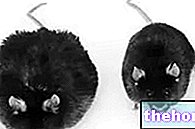What is Enterostatin
Enterostatin is a pentapeptide involved in the body's satiety mechanisms; in fact, scientists have shown how its injection into the brains of mice leads them to a progressive reduction in food consumption, proportional to the dose of enterostatin injected.

This pentapeptide derives from pancreatic colipase, an enzyme secreted as a zymogen (procolipase) and activated by trypsin in the duodenum; its presence facilitates the adhesion of pancreatic lipases to the lipid drops, facilitating the digestion of fats. The colipase is in fact attracted to the lipid drops by the negative charge conferred on them by the bile acids.
Activation of colipase by trypsin involves the removal of a pentapeptide from its N-terminal end. This peptide is called enterostatin
Functions
As anticipated, enterostatin acts as a satiety signal for lipids: it reduces insulin secretion, increases the activity of brown adipose tissue and stimulates the release of corticosteroids at the adrenal level; enterostatin also favors the onset of a sense of fullness in the stomach, from which probably derives its regulatory role in lipid intake and in reducing body weight.




























